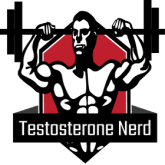If you’re into strength training, you’ve probably heard of testosterone.
It’s a hormone that plays a key role in building muscle, burning fat, and boosting performance. But what exactly is testosterone, and how does it affect your body and your workouts?
In this article, we’ll give you a brief overview of the importance of testosterone in strength training, and some tips on how to optimize your levels naturally.
| Key Takeaway | Explanation |
|---|---|
| Testosterone is a hormone that plays a key role in building muscle, burning fat, and boosting performance. | Testosterone stimulates protein synthesis, increases muscle mass, enhances fat metabolism, and improves recovery. It also affects mood, motivation, and confidence. |
| Testosterone levels are influenced by various factors, such as age, genetics, lifestyle, nutrition, and training. | Testosterone levels decline with age, but can be maintained or increased by optimizing sleep, stress management, diet, and exercise. Some foods and supplements can also boost testosterone production. |
| Strength training is one of the best ways to increase testosterone levels naturally. | Strength training causes muscle damage and metabolic stress, which trigger the release of testosterone and other anabolic hormones. The intensity, volume, frequency, and rest periods of strength training can affect the testosterone response. |
| Testosterone can enhance strength training performance and results. | Testosterone can increase muscle strength, power, endurance, and hypertrophy. It can also reduce muscle soreness and fatigue, and speed up recovery. Testosterone can also improve mental focus, aggression, and competitiveness. |
| Testosterone is not a magic bullet for strength training success. | Testosterone is only one of many factors that influence strength training outcomes. Other factors include genetics, nutrition, recovery, technique, programming, and individual differences. Testosterone is also subject to feedback loops and homeostasis mechanisms that limit its effects. |
What is Testosterone?
Testosterone is a hormone that is produced by the testicles in men and the ovaries in women, although in much smaller amounts. It is responsible for many functions in the body, such as sexual development, sperm production, mood, bone density, and fat distribution.
One of the most noticeable effects of testosterone is its influence on muscle growth and strength. Testosterone stimulates the production of protein, which is the building block of muscle tissue. It also increases the number of red blood cells, which carry oxygen to the muscles and improve their endurance. Testosterone also activates the growth hormone, which helps the body to use fat as energy and promotes muscle repair.
Testosterone levels vary depending on age, gender, health, and lifestyle factors. Some people may have low testosterone due to genetic conditions, diseases, medications, or stress. Low testosterone can cause symptoms such as low libido, erectile dysfunction, fatigue, depression, and loss of muscle mass and strength.
On the other hand, some people may have high testosterone due to tumors, steroids, or supplements. High testosterone can cause problems such as acne, aggression, infertility, liver damage, and heart disease.
Testosterone is an essential hormone for both men and women, but it needs to be balanced and regulated by the body. Too much or too little testosterone can have negative effects on health and well-being. If you suspect that you have a testosterone imbalance, you should consult your doctor for diagnosis and treatment options.
The Relationship Between Testosterone and Strength Training
If you’re looking for a way to boost your testosterone levels, you might want to hit the gym.
Strength training, or lifting weights, is one of the best ways to stimulate your body’s natural production of this hormone. Testosterone is responsible for many aspects of your health and performance, such as muscle mass, bone density, libido, mood, and energy. It also helps you burn fat and recover faster from workouts.
But how does strength training affect your testosterone levels?
And what are the best exercises and strategies to maximize this effect?
Here are some answers to these questions.
Strength training causes micro-tears in your muscle fibers, which triggers a repair process that involves inflammation and hormonal responses. One of these hormones is testosterone, which helps your muscles grow bigger and stronger. The more muscle mass you have, the more testosterone you produce, creating a positive feedback loop.
However, not all strength training programs are equal when it comes to boosting testosterone.
Some factors that influence this are:
- The intensity of your workout: You need to lift heavy enough weights that challenge your muscles and cause fatigue. Aim for 70-85% of your one-rep max (the heaviest weight you can lift for one repetition) and perform 3-5 sets of 6-12 reps per exercise.
- The volume of your workout: You need to do enough total work to stimulate your muscles and hormones. Aim for 15-20 sets per muscle group per week, and vary your exercises and angles to target different muscle fibers.
- The rest periods between sets: You need to keep your rest periods short enough to maintain a high level of intensity and metabolic stress. Aim for 30-90 seconds of rest between sets, depending on the exercise and your goal.
- The type of exercises you do: You need to do compound exercises that involve multiple joints and large muscle groups, such as squats, deadlifts, bench presses, rows, pull-ups, and dips. These exercises recruit more muscle fibers and elicit greater hormonal responses than isolation exercises that target only one muscle group.
- The timing of your workout: You need to train at a time when your testosterone levels are naturally high, such as in the morning or early afternoon. Avoid training late at night, as this can interfere with your sleep quality and recovery.
By following these guidelines, you can optimize your strength training program for testosterone production and enjoy the benefits of this hormone for your health and performance.
How to Boost Testosterone Naturally
Testosterone is a hormone that plays an important role in many aspects of health, such as muscle mass, bone density, libido, mood, and energy levels.
If you want to boost your testosterone naturally, there are some simple and effective ways to do so.
Here are some tips on how to optimize your diet, exercise routine, and lifestyle to increase your testosterone levels:
- Eat more protein, healthy fats, and zinc-rich foods. Protein helps your body produce testosterone and maintain muscle mass. Healthy fats, such as omega-3s and monounsaturated fats, support hormone production and reduce inflammation. Zinc is a mineral that is essential for testosterone synthesis and can be found in foods like oysters, beef, pumpkin seeds, and beans.
- Exercise regularly and lift weights. Physical activity stimulates testosterone production and improves blood circulation. Lifting weights, especially heavy weights, increases testosterone levels by creating muscle damage and triggering repair processes. Aim for at least 150 minutes of moderate to vigorous exercise per week, and include some resistance training in your routine.
- Get enough sleep and manage stress. Sleep is crucial for hormone balance and recovery. Lack of sleep can lower your testosterone levels and impair your performance. Aim for at least seven to eight hours of quality sleep per night, and avoid caffeine, alcohol, and blue light before bed. Stress can also reduce your testosterone levels by increasing cortisol, a hormone that blocks testosterone production. Find healthy ways to cope with stress, such as meditation, yoga, breathing exercises, or hobbies.
- Avoid alcohol, smoking, and drugs. Alcohol can interfere with your liver’s ability to metabolize testosterone and increase estrogen levels. Smoking can damage your blood vessels and reduce blood flow to your genitals. Drugs can also affect your hormone levels and impair your sexual function. If you want to boost your testosterone naturally, limit or avoid these substances as much as possible.
- Take natural supplements if needed. Some natural supplements may help you increase your testosterone levels by providing nutrients or herbs that support hormone production or function. For example, vitamin D, magnesium, ashwagandha, fenugreek, and D-aspartic acid are some of the most popular natural testosterone boosters. However, before taking any supplement, consult with your doctor and make sure it is safe and effective for you.
Conclusion
- Testosterone is a hormone that plays a vital role in strength training and muscle development.
- Testosterone levels are influenced by various factors, such as diet, exercise, lifestyle, and genetics.
- Strength training can boost testosterone levels naturally and enhance muscle growth and performance.
- To optimize your testosterone levels, you should follow a balanced diet, a regular exercise routine, and a healthy lifestyle.
- Testosterone can help you unleash your strength and achieve your fitness goals.
In this article, we have learned about the benefits of strength training for boosting testosterone levels. Testosterone is a hormone that plays a vital role in many aspects of health, such as muscle growth, bone density, mood, libido, and more.
Low testosterone can lead to various problems, such as fatigue, depression, erectile dysfunction, and osteoporosis. Strength training can help increase testosterone production by stimulating the muscles, creating micro-tears, and triggering the body’s repair process. Strength training can also improve blood flow, insulin sensitivity, and metabolic rate, which can further enhance testosterone levels.
To get the most out of your strength training sessions, you should follow some tips, such as lifting heavy weights, resting adequately between sets, eating enough protein and healthy fats, and avoiding overtraining and chronic stress.
By incorporating strength training into your fitness routine, you can optimize your testosterone levels and enjoy better health and well-being.
FAQs
What is strength training?
Strength training is an organized exercise in which muscles of the body are made to contract in response to external weights, body exercise or resistance, or other devices in order to stimulate growth and strength.
What are the benefits of strength training?
Strength training has important benefits beyond building big muscles, such as:
- Toning and shaping the body for weight loss, personal appearance or bodybuilding competition.
- Improving sporting performance by increasing bulk, strength, power and endurance in various sports.
- Preventing lifestyle diseases such as diabetes, osteoporosis, and obesity.
- Building strength and improving balance and functionality, especially as we age.
- Assisting in recovery from, or management of, chronic illnesses or conditions such as heart disease, stroke, hip replacement, and arthritis.
How often should I do strength training?
The frequency of strength training depends on your goals, fitness level, and recovery ability. A general recommendation is to do strength training 2 to 3 times per week, with at least 48 hours of rest between sessions. However, you can adjust this according to your individual needs and preferences.
How many sets and reps should I do?
The number of sets and reps you do for each exercise depends on your goals, fitness level, and the type of exercise. A general guideline is to do 1 to 3 sets of 8 to 15 reps for each exercise, with a moderate to high intensity. However, you can vary this depending on your specific objectives and the phase of your training program.
What are the best exercises for strength training?
There is no single answer to this question, as different exercises target different muscle groups and have different effects on strength development. However, some of the most common and effective exercises for strength training are:
- Squats: A compound exercise that works the lower body muscles, especially the quadriceps, hamstrings, glutes, and calves.
- Deadlifts: A compound exercise that works the posterior chain muscles, especially the hamstrings, glutes, lower back, and traps.
- Bench press: A compound exercise that works the upper body muscles, especially the chest, shoulders, and triceps.
- Rows: A compound exercise that works the upper back muscles, especially the lats, rhomboids, and biceps.
- Overhead press: A compound exercise that works the shoulder muscles, especially the deltoids, triceps, and upper traps.
- Pull-ups: A compound exercise that works the upper body muscles, especially the lats, biceps, and forearms.
I've been fascinated by natural male hormone optimization since 2016. And ever since I've been going through boatloads of different meta-analyses and scientific data associated with increasing testosterone levels naturally. I hold a PhD degree in public health and have 10+ scientific publications on Google Scholar. Thus, in my collective work here you'll find helpful tricks, natural remedies, detailed product reviews (including stuff I've personally tried)... and more!



